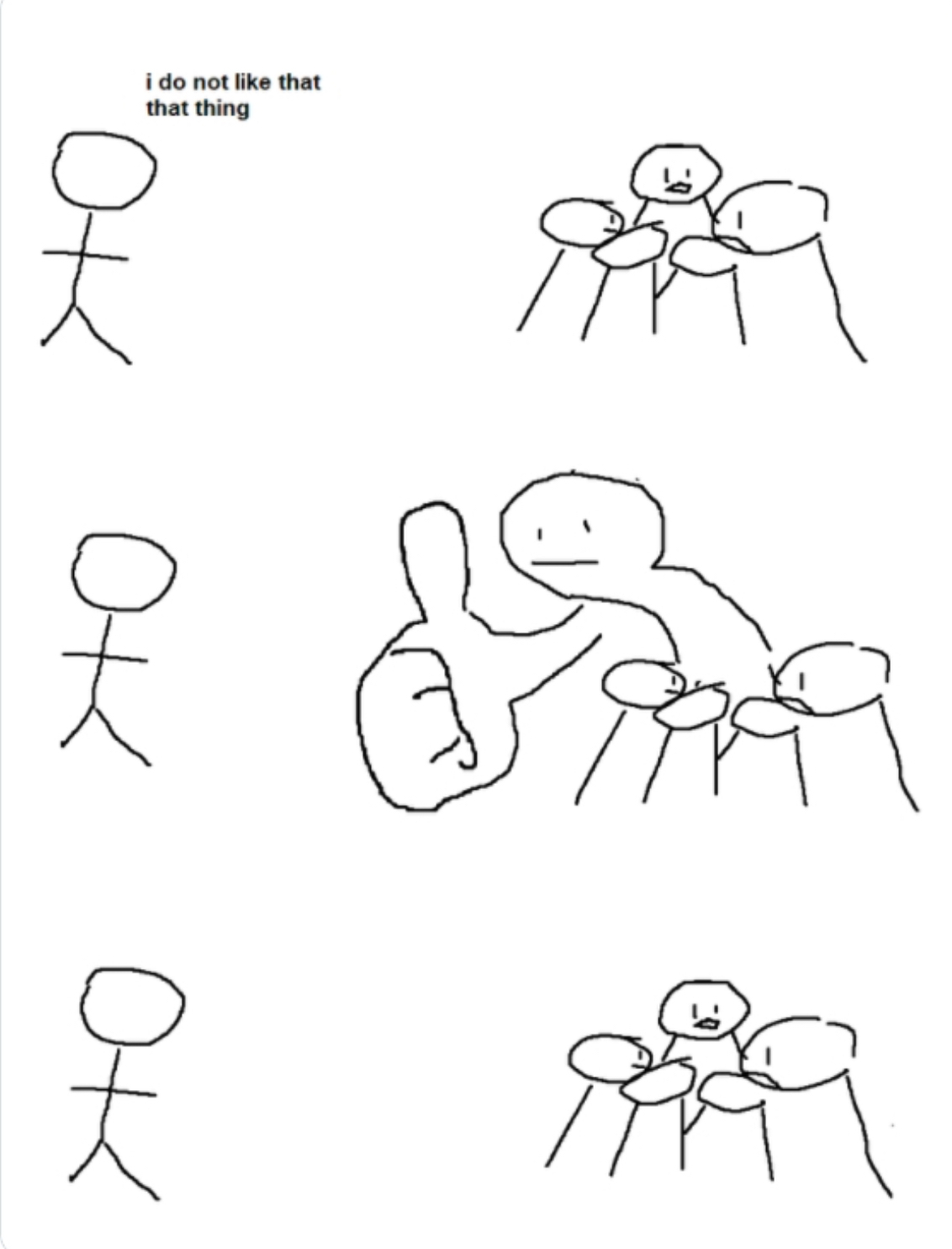Edit: A few people have interpreted the title as serious, so I wanna clarify that it was meant as a sarcastic joke about how little sense the neurotypical world makes to me, but it is still legitimately me asking for help understanding said neurotypical world.
Was having a conversation with a friend today about why I seem unapproachable to people online. Apparently it’s for 2 reasons.
One is that I say “K.” all the time, as a short way of saying okay. She pointed out that most people find this rude and offensive. This kinda baffled me, because like why? She explained that like, if somebody were to give a long emotional speech and I just responded “K.” that would be offensive. That confounds me. So it’s rude in one context, and neurotypicals have decided to be offended by it in all contexts? But the reason it’s rude is what confuses me more. Apparently it’s considered lazy because you could have just typed out the word, but like, that applies to all text speech and nobody’s mad about people shortening those words.
But it got more confusing when she explained the second reason, which is that I end all of my sentences with proper punctuation, which she said “makes people feel like I’m done with the conversation and not interested.” But just a second ago improper grammar was rude, and now proper grammar is rude instead.
It baffles me. You can’t just use proper or improper grammar. Use too much improper grammar and you’re lazy and rude. Use too little and you’re also rude. But you can’t just use any improper grammar, you have to use the very specific subset of improper grammar that’s been deemed acceptable and not lazy (even though it’s exactly as lazy as what they do consider lazy.)
To be clear, I’m not bitter, and I’m definitely gonna adjust my behavior to hopefully seem a little less rude to people. I think that’s just a nice thing to do. I just find the neurotypical mind utterly fascinating. I don’t think they even realize how many contradictions exist in the social rules they all so easily accept.
Your friend is at least partially misinforming you. It’s fine to write k instead of ok in almost all situations. But either of them can be rude if the other person would expect more emotive words. For example here’s when k is fine:
Them: Bring my pen when you come into the other room
You: k
And here’s where k is not fine:
Them: Wanna go grab some drinks tonight at 8?
You: k
That’s rude. They would want to hear you actually be interested in their invitation. Like saying “great” or “I’m in” or whatever.
…Ooooh. I think that’s what she was trying to tell me actually and I just completely misunderstood. That second example is a type of situation I used it a lot in. I didn’t realize people needed to know how interested I was. I thought they just needed a quick confirmation.
Often people are looking for some sort of validation, even when it’s not obvious.
If they say “I can’t join you in the bar today, I have too much work to catch up on”, “K.” is not a good answer. Several aspects needs to be addressed, ideally:
- That’s too bad
- Next time
- Commentary on the state of work: Keep your head above water/your boss is such a jerk/we’ll make up for it after your deadline on Thursday/whatever, depending on the situation and your relationship.
Basically, it’s a way to show that you care about what they’re telling you. It can be a bit exhausting at times.
This is really helpful. I didn’t realize there were so many situations people were looking for validation. I just assumed when they said something like that it was just to quickly let me know and “K.” was all they needed.
To expand on this, consider that others cannot know what you’re thinking without you telling them.
You might feel “I’m looking forward to that and I think we will have fun together.”
But if you don’t tell someone that, they are left to guess for themselves. That uncertainty is very uncomfortable.
Neurotypicals learned to give and use clues to help navigate life and determine if they need to change their actions. But it’s a complicated balance. Most people don’t like being told “I’m not interested in that.” They’d rather hear “no thank you, maybe some other time.” But they’d also much rather hear “that sounds like fun!” than hearing “yeah sure”.
It can be very difficult to imagine what it’s like to have a different set of information than what you yourself know. Practice this skill! It will help you in lots of situations. Do your best to reduce uncertainty while considering how it might feel to hear the new information you’re sharing for the first time.
Good luck out there! <3
Ah, I think the hangup for me wasn’t so much not understanding that they had different info than me, but that they wanted the info I had. Moreover, that they might feel differently about things than I did, and they knew that, so I needed to make sure they knew how I felt.
When I see somebody just respond “K.” or “Alright” to an invitation to do something, that always made me happy enough to know that they were gonna be there because I figured if they didn’t want to, they’d have found an excuse to say no. I didn’t suspect that others might not just assume somebody was happy to be there the way I did. It’s helpful to know I need to clear up how I feel in some way for them to understand that I want to be there and enjoy their company.
To make things more confusing, responding to an invitation to drinks with “k!” might be ok, depending on who’s asking and the context.
If it’s your roommate asking, and they’re doing it because there’s a sporting event or because drinks are an established ritual, it’d be fine. If it’s your boss, or a new (potential) friend or colleague, a possible romantic interest, or a close friend and it’s not something they usually do or invite you out for, then those situations have a lot more weight, and expect a more fulsome and engaged reply.
Saying “k” probably seems dismissive to most people
Yup. It’s saying “I’m acknowledging that I heard what you said, but only giving the bare minimum effort in responding.” It could also potentially sound sarcastic and/or condescending, depending on the tone.
It basically comes off like this thumbs up meme:

K can give the impression that you don’t care and don’t want to be bothered with it. The effort in your response is expected to be proportional to the effort it took to write the message to you.
If someone write a long personal message to you, and all you responds is K, then it gives the impression that you might not even read the message. Why even bother next time?
Proper grammar in informal settings is a difficult one, but this is my theory:
It might give the impression of mismatch in vibes. There’s a difference in informal speak and formal speak, and participants in a conversation are expected to be in the same wavelength. An extreme example, but it’s like when everybody is dressed casually at a social gathering, but you decide to show up in a three piece suit.
I agree with so many folks on this thread- your friend is pushing one set of social queues that they abide by, but that isn’t everyone.
I think this has more to do with communication over text, as there are NO physical cues to help gauge tone. I’m not autistic, however when texting I’ve learned to practice mirroring for each person I chat with. If I notice they end their sentences without punctuation, I’ll adopt that. If I notice more emojis, I’ll have fun with that, or hold off if it seems that they don’t use them.
A big one for me is using “!”. I usually will use “!” to signal excitement/ friendly tone, however I’ve learned some people see it as an angry tone and thought I was freaking out about what they said.
When I talked to my therapist, he noted with his clients that 90% of disputes start over social media/ texting. I almost lost a friend when they sent me a lecture from a professor talking about the Israeli/ Palestine conflict. A few days later I saw a funny music composition video titled “old MacDonald had a lobotomy”. I thought I was just sending a funny video, but she thought it was in response to her video, and I got a stern text that I had to clear up.
Cue(s) not queue(s). One is a hint or indicator, and the other is an organized line. A social cue. Solid points as well.
I agree after reading the rest of the thread, but I think that may also have partially been her intention. I hang out primarily with the same group she does, so she’s trying to help me get along with that particular group. Even so, her tips could help me come off as less robotic in general, even if they’re not strict rules that need to be followed, so I think I’m gonna still try to take her tips and just adapt them to myself.
Definitely gonna stop saying “K.” though. I don’t have the skill to be nuanced enough to not use it improperly. Additionally, I always assumed people just wouldn’t try to gauge my tone over text if I didn’t specify it, but I guess unlike me it’s important to neurotypicals to understand how each other feel, even if they have to assume, so I’ll just have to cut down on the assumptions they have to make.
ꓘ
Found the Australian
Communication is a two way street. It’s both about the message the sender is trying to convey, but also the way the receiver interprets it. As a (mostly) neurotypical thinker, this is even hard for many of us to get right.
An example for clarity is the response your getting in the comments to your friends comments. Various people are disagreeing and agreeing to different levels. Conversation is navigating the complicated dynamics to as the sender, sending your message in a way the receiver will get the impression you are trying to give, and as a receiver, trying to understand the intent of the message the sender is trying to show.
There aren’t many hard or fast rules. In different online communities, different styles and patterns can conotate different things. There are patterns and styles I use here on Lemmy for example, I would never use in a sports online community because they would be interpreted differently there.
My advice is don’t beat yourself up about it. If you’re not getting the type of interactions you’re expecting in a particular community, that might be the time to ask for feedback or see if your communication style is different than the local group there. But the ephemeral nature of these online conversations make it the perfect place to experiment and find a communication style that works for you and gets the response from others you are looking for.




